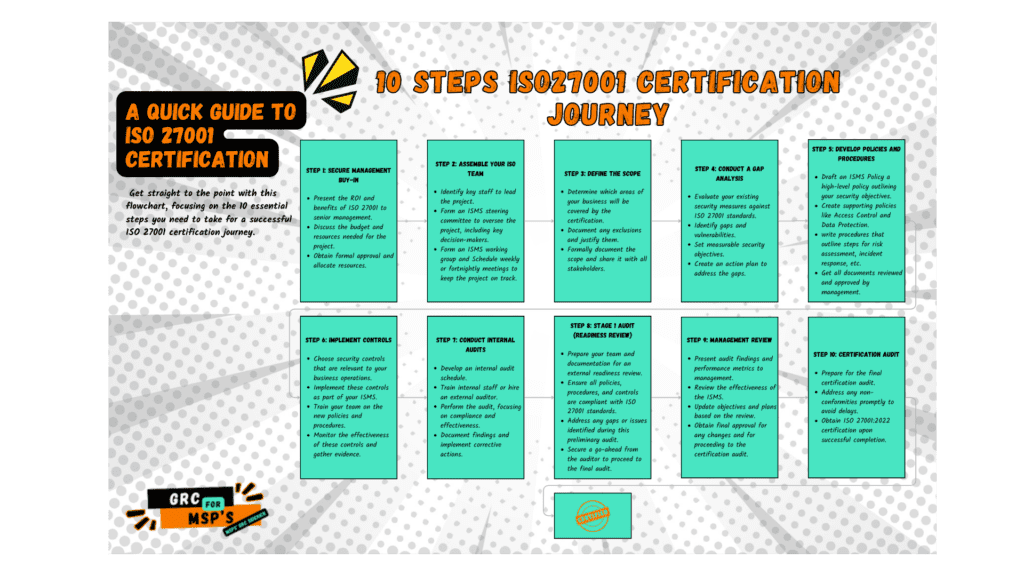In today’s digital landscape, organisations are facing an ever-increasing array of cybersecurity threats. As technology advances and the volume of data organisations manage continues to grow, it becomes more important than ever for IT Managed Service Providers (MSPs) to implement robust information security management systems. One of the most effective ways to achieve this is through ISO 27001:2022 certification, an internationally recognised standard for information security management.

ISO 27001:2022 certification not only demonstrates an MSP’s commitment to maintaining high-quality information security practices, but also helps to strengthen customer trust and compliance with various regulations. By aligning with the latest global standards and best practices, IT MSPs can better protect sensitive data and enhance their overall security posture.
Key Takeaways
- ISO 27001:2022 certification is essential for IT MSPs to ensure robust information security management.
- Achieving certification helps strengthen customer trust and ensure compliance with regulations.
- IT MSPs must continually improve and maintain their information security practices to remain aligned with global standards.
Why ISO 27001:2022 Certification Matters to IT MSPs

Key Benefits of Certification
The ISO 27001:2022 certification plays a crucial role in the world of information security management. This updated standard addresses the growing cybersecurity challenges faced by IT Managed Service Providers (MSPs). As digital trust becomes increasingly important, maintaining a robust information security management system (ISMS) is essential for any successful IT MSP.
One significant advantage of achieving ISO 27001:2022 certification is the establishment of trust with clients. With an internationally recognised certification, IT MSPs can demonstrate their commitment to securing sensitive information, fostering confidence in their services. This can lead to greater client retention and higher chances of winning new business.
Another critical benefit is the enhanced cybersecurity posture that comes with adhering to the updated ISO 27001:2022 standard. By implementing a comprehensive ISMS, IT MSPs can better protect themselves and their clients from cyber threats, ultimately mitigating the risk of data breaches and security incidents.
Value for IT MSPs
For IT MSPs, obtaining the ISO 27001:2022 certification provides numerous value propositions. First and foremost, clients will increasingly demand stringent information security measures from their MSPs, making certification a key differentiator in a competitive market. By achieving this standard, MSPs can stand out from competitors who may have yet to update their information security practices in line with the latest guidelines.
Moreover, adherence to the ISO 27001:2022 standard can also lead to improved internal processes and overall operational efficiency. By identifying and managing risks effectively and consistently, IT MSPs can optimise their information security management, leading to a more resilient, agile, and scalable organisation.
In the ever-evolving landscape of information security, IT MSPs must stay ahead of the curve to maintain a competitive advantage. Embracing the ISO 27001:2022 certification allows MSPs to enhance not only their reputation but also their ability to protect valuable client data. Consequently, investing in certification now is a strategic decision that can pay dividends in the long term.
Understanding ISO 27001:2022 Standards and Its Key Elements

The ISO 27001:2022 is the latest update to the internationally recognised Information Security Management System (ISMS) standard, which focuses on enhancing organisations’ security and reducing risks in information handling. This section delves into the key aspects of the ISO 27001:2022 standard and the differences between it and its predecessor, ISO 27001:2013.
ISO 27001:2022 Vs ISO 27001:2013
The ISO 27001:2022 standard introduces several changes compared to ISO 27001:2013. For example, the reduction of controls and domains promotes a more streamlined approach to managing information security risks and implementing security controls. Additionally, new controls have been added to address evolving cyber threats and better align with modern technology and business environments.
Transitioning from ISO 27001:2013 to ISO 27001:2022 requires organisations to update their policies, procedures, and standards in line with the latest guidelines. Companies are expected to complete this transition by October 31, 2025, necessitating education, staff training, and budget allocation.
Understanding Annex A
Annex A is an integral part of the ISO/IEC 27001 standard, outlining security controls and the details necessary for the effective implementation of the Information Security Management System. The primary objective of Annex A is to ensure the confidentiality, integrity, and availability of data.
In ISO 27001:2022, the structure of Annex A has been reorganised, and some controls have been added, removed, or amended to address emerging risks and challenges in information security. A thorough understanding of Annex A is essential for organisations seeking ISO 27001:2022 certification to achieve a robust and comprehensive security management system.
Implementing ISO 27001:2022 comes with several benefits, such as developing a culture of security awareness, increasing system resilience against cyber-attacks, effectively managing security incidents, and identifying and managing security risks in a timely manner. As such, IT MSPs should consider initiating the transition process to stay ahead in an ever-changing and increasingly risk-laden digital landscape.
The Certification Process

The ISO 27001 certification process is a structured approach that aims to ensure that an IT MSP’s Information Security Management System (ISMS) meets the requirements established by the ISO 27001 standard. This process is divided into several stages, including audits and gap analysis, which help to identify and address any gaps in the company’s security systems.
From Gap Analysis to Certification
Before beginning the certification process, a company should conduct a gap analysis to assess the current state of their ISMS and identify any potential shortcomings. This analysis serves as the foundation for creating a plan to address gaps and align the company’s security practices with the ISO 27001 standard.
Upon addressing the identified gaps, the company can proceed with the certification process. The first step is to secure commitment from stakeholders, ensuring that all necessary resources are available for implementing and maintaining a compliant ISMS. The next steps involve conducting internal audits, addressing non-conformities, and preparing for the surveillance audit by the certification body.
Once the company has passed all the necessary audits, it can be awarded the ISO 27001 certification. This certification serves as a testament to the company’s commitment to protecting sensitive information and adhering to the best practices in information security management. Regular surveillance audits and continuous improvement efforts are required to maintain and demonstrate ongoing adherence to the standard.
The Role of Audits
Audits play a crucial role in the certification process. There are several types of audits an organisation needs to undergo, such as internal audits, surveillance audits, and transition audits. The internal audit is conducted by the organisation itself or by an appointed third-party ISO consultant, to evaluate their ISMS against ISO 27001 requirements. This audit helps to identify any gaps or areas of non-compliance.
After the internal audit and necessary corrective actions, the organisation undergoes a surveillance audit carried out by an independent certification body. This audit serves as a follow-up to ensure that the implemented security controls and processes are effective and compliant with the standard.
When a company undergoes a significant change, such as organisational restructuring or system upgrades, a transition audit might be necessary. This audit evaluates the ISMS’s ability to adapt to the new changes while still maintaining compliance with ISO 27001 requirements.
Maintaining and Improving Your ISO 27001 Certification

The journey towards a robust information security management system (ISMS) doesn’t end with obtaining an ISO 27001 certification. Maintaining and improving the ISMS is a critical component in demonstrating your commitment to information security and adherence to the latest ISO 27002:2022 guidelines.
One crucial aspect of maintaining your certification is risk management. Risks should be continually identified, assessed, and prioritised as part of an ongoing process. Developing a risk treatment plan allows organisations to determine the most appropriate actions for combating potential threats and ensuring the integrity of their ISMS.
Implementing a continual improvement or continuous improvement approach enables your organisation to review the effectiveness of its ISMS and identify areas for potential growth or optimisation. By regularly evaluating each component of your ISMS, you can ensure that it adapts to evolving threats and maintains compliance with relevant ISO standards such as ISO 27002:2022.
Management reviews are an essential aspect of the ISO 27001 maintenance process. They help to establish the effectiveness of your ISMS, identify any areas of nonconformity, and evaluate the overall performance of your information security policies and procedures. As part of this review, you should routinely analyse your organisation’s risk treatment plan and make any necessary adjustments to stay current with industry best practices.
To ensure the efficacy of your ISMS, make sure to regularly review and update your Statement of Applicability (SoA). This involves assessing the controls detailed in ISO 27002 and determining which ones are relevant to your organisation. The SoA also helps you maintain a comprehensive understanding of your ISMS and assists you in making informed decisions about security controls.
In conclusion, incorporating risk management, continual improvement, management reviews, and updating your SoA within your organisation’s routine practices will help you maintain and enhance your ISO 27001 certification. Embracing these elements and adhering to the ISO 27002:2022 guidelines will ensure that your ISMS remains robust, resilient, and relevant in an ever-changing technology landscape.
Key Considerations for IT MSPs Looking to Get ISO 27001:2022 Certified
As the information security landscape evolves, IT managed service providers (MSPs) need to keep up with the latest standards and best practices. One such essential step forward is obtaining the ISO 27001:2022 certification. This updated standard facilitates stronger cybersecurity, business continuity, and data protection, ensuring GDPR compliance and robust IT governance.
Understanding the ISO 27001:2022 changes: Organisations transitioning from ISO 27001:2013 should become familiar with the new control framework, which consists of a reduced number of controls and domains, added controls, and structural changes. Preparing for the transition helps minimise disruption and smoothes the certification process.
Investing in training: Appropriate training courses are essential for individuals involved in implementing and maintaining an effective information security management system (ISMS). Training ensures that all parties are educated about the latest security policies, risk assessments, and data protection regulations like GDPR, ISO 27701, ISO 27017, and ISO 27018.
Aligning with other standards: Integrating the ISMS with other quality management systems, such as ISO 9001, is a critical step in demonstrating that the MSP values continuous improvement, consistency, and customer satisfaction. This alignment establishes a robust foundation for company-wide governance and efficient processes.
Implementing risk assessments: A crucial component of ISO 27001:2022 certification involves identifying and analysing potential threats to the MSP’s information assets. Regular risk assessments ensure that appropriate technical and organisational measures are in place to protect against data breaches and facilitate cyber resilience.
Developing effective communication: An essential aspect of the ISO 27001:2022 standard is clear communication with interested parties – including customers, employees, and partners. Effectively conveying the MSP’s commitment to information security and data protection demonstrates transparent leadership and reinforces trust.
Leveraging certification services: MSPs should make use of accredited certification bodies like Intertek SAI Global Australia and NQA to receive impartial assessments and ensure their ISMS is compliant with ISO 27001:2022 requirements.
By addressing these key considerations, IT MSPs can confidently embark on the journey towards obtaining ISO 27001:2022 certification, demonstrating their dedication to information security, privacy, and customer satisfaction.
Frequently Asked Questions
What are the key benefits of ISO 27001 certification for IT MSPs?
Obtaining ISO 27001 certification offers several benefits for IT MSPs, including a robust information security management system (ISMS) framework, reduced risk of data breaches, and improved client confidence. This internationally recognised standard not only ensures your organisation is adhering to best practices but also demonstrates to clients and partners that you’re dedicated to protecting their data. An ISMS can help MSPs identify and mitigate potential security risks and consistently improve their information security processes.
How does obtaining ISO 27001 certification now give IT MSPs a competitive advantage?
As the demand for ISO 27001 compliance grows, having this certification in place can be a valuable differentiator in a competitive market. Many clients now expect MSPs to be ISO 27001 certified, so obtaining this certification now can give your organisation a proactive advantage over competitors who may not have made the investment. In addition, with the increasing risk of cyberattacks and data breaches, companies are seeking MSPs that can provide the highest level of security.
Can ISO 27001 certification help IT MSPs comply with GDPR and other regulations?
Yes, ISO 27001 certification can assist IT MSPs in complying with regulations such as GDPR, as it provides a comprehensive framework for managing and protecting sensitive information. By implementing an ISMS that adheres to ISO 27001, your organisation can help ensure that you’re taking appropriate measures to secure personal data and comply with data protection regulations.
How does ISO 27001 certification impact client trust and business reputation?
ISO 27001 certification can greatly enhance client trust and confidence in your organisation’s ability to protect their data. By obtaining this certification, you’re demonstrating a commitment to information security best practices and a dedication to continuously improving your ISMS. This can lead to increased credibility, stronger business relationships, and potential opportunities for growth.
What are the costs and resources involved in achieving ISO 27001 certification?
Achieving ISO 27001 certification typically involves significant investments in time, staff resources, and external consulting. Costs can also include training, documentation, and auditing fees. However, these investments can be seen as strategic priorities, given the potential risks associated with non-compliance or data breaches. Additionally, obtaining and maintaining certification can lead to long-term operational efficiency, as maintaining a robust ISMS can help identify and manage risks more effectively.
How can IT MSPs maintain their ISO 27001 certification and stay up-to-date with changes?
To maintain ISO 27001 certification, IT MSPs need to conduct periodic internal audits, continually review and improve their ISMS, and stay informed about changes to the standard. They should also commit to regular communication with employees regarding the importance of information security and foster a culture of continuous improvement. Finally, regular external audits will be required to ensure adherence to the standard and allow for certification renewal.


Hi
I came across your website on Google. We specialise in providing HR & recruitment services to MSPs. To engage a common MSP audience, would you be open to being a thought leadership speaker on a 30 mins webinar with us about what ISO certification means for MSP, why they need to get certified, how it will help MSPs, how you help companies and how you and your MSP clients overcome their people and recruitment challenges?
Hopefully, creating potential future referral opportunities in the process.